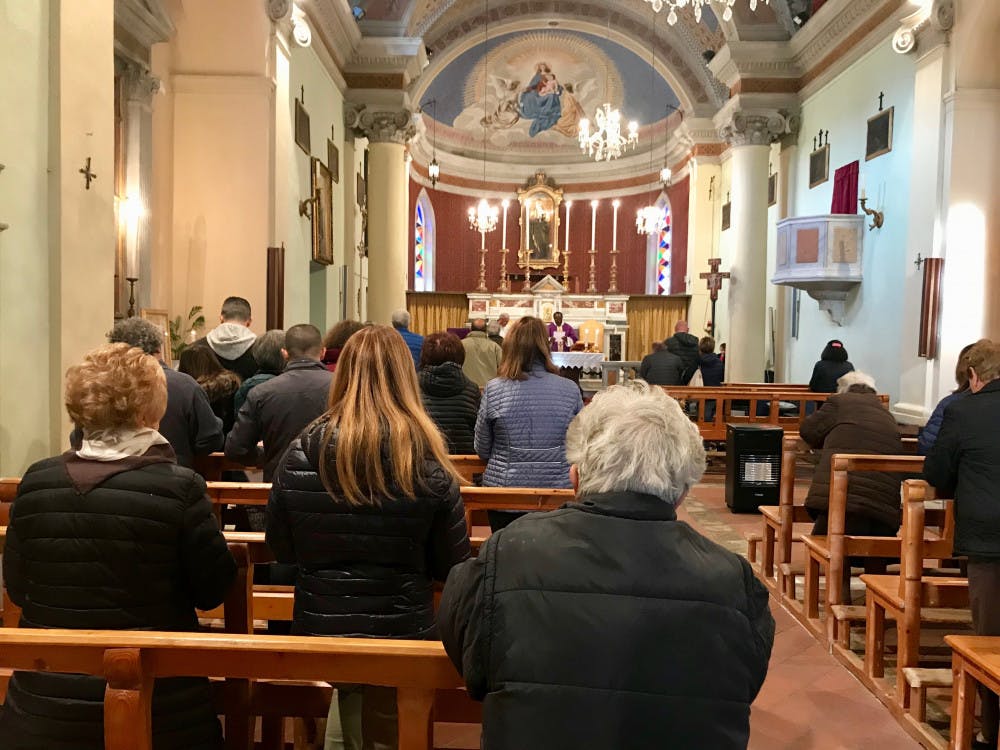By Grace Gottschling
Staff Writer
Surrounded by the Grecian-accented, pale green walls of the First Baptist Church of Trenton, students from the College and immigrant children filled the pews in preparation to practice their conversational English skills.
Students enrolled in the College’s American English and World English courses are partnering with immigrants from Myanmar, the country formerly known as Burma.
English professor Felicia Steele, who teaches the courses, said the program was established roughly 10 years ago.
“The goal is to provide (the immigrants) with an opportunity where they are not feeling judged for their English language use,” Steele said. “Research shows that the way you learn a language is by using it. We are trying to provide an opportunity to these students to use English.”
Adam Sibley, the program coordinator for the Advanced Center for Engaged Learning, said Steele is one of the many faculty members at the College who believes learning is enhanced when students get out of the classroom and into the community.
“The project is borne as much out of her (Steele’s) desire to challenge students to think and act critically as her passion for service,” Sibley said.
Since the start of the program, Steele has worked with a number of different sites to fulfil her classes’s engaged learning component.
The most successful site she found has been working with the First Baptist Church of Trenton with the church’s reverend, Calvin Powell.
The Rev. Powell has allowed Steele’s classes to work as conversation partners with the immigrants from Myanmar in his church.
This is the fourth time Steele has worked with Rev. Powell’s church in the past six years. The current immigrants are between the ages of eight and 20 years old. Together, the students and immigrants are able to foster and learn new skills, whether that be through practicing English or studying how it’s acquired as a second language.
“I’ve learned it’s so important to give some of your time to children in communities like these, with the goal of improving their spoken English, providing them with a conversation and a friend,” said Meriah Murphy, a senior English major.

Students from the College and immigrant children filled the pews in preparation to practice their conversational English skills (envato elements).
There are currently five or six children from immigrant families who are working with students at the church. In the first year of Steele’s program, there were about a dozen.
The smaller class size makes it easier for students to work in a one-on-one setting.
“Making sure they feel heard and understood can go a long way in boosting their confidence,” Murphy said. “I’m grateful I’ve had the opportunity to connect with this issue on a level beyond the textbook.”
Twice a semester, Steele sends four students to meet with the immigrants, and the program has left its mark on those who have taken the class.
“The kids were much more outgoing than I expected,” Murphy said. “They were happy to have us, which made the experience all the more rewarding.”
Steele’s model focuses on establishing new experiences for the betterment of both her students in the class and the young immigrants.
“That’s part of the reason that we do this, so that (students at the College) can develop empathy for English language learners,” Steele said.
According to Steele, the classes’ goal is to examine the materials for teaching English as a second language and evaluate what kinds of ideologies are embedded and reproduced through learning English as a second language.
“The class gets to see English language learners as they are struggling to make sense of American English,” Steele said.
Steele, along with the Center for Community Engaged Learning and Research, is making strides toward establishing an immersion model that will greatly advance students by giving them tangible methods to better understand and prepare for practical application in the real world.
“Through programs like Advanced Community Engaged Learning, the College is creating a generation of graduates who, no matter their choice of profession, is prepared to live civically engaged lives,” Sibley said.







